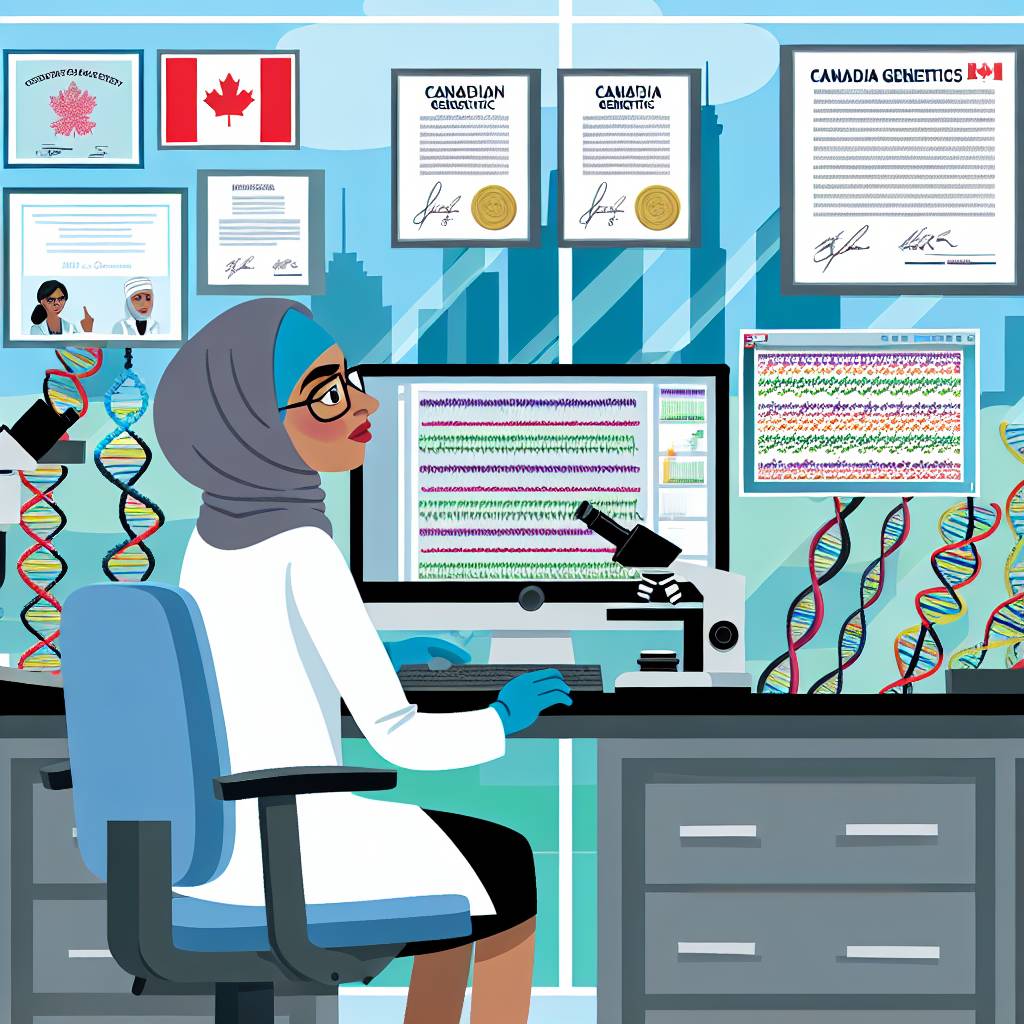Introduction to Geneticists’ Role in Healthcare
Geneticists play a crucial role in the Canadian healthcare system.
They analyze genes to improve patient care and treatment outcomes.
Through their work, they contribute significantly to innovative healthcare solutions.
Understanding Genetic Research
Geneticists conduct extensive research to uncover the links between genes and diseases.
This research lays the foundation for personalized medicine.
Additionally, it enables healthcare professionals to develop targeted therapies.
Applications in Clinical Settings
Geneticists work closely with clinicians to interpret genetic tests.
They help identify genetic disorders and assess risks for inherited conditions.
Moreover, they guide treatment options based on genetic profiles.
Collaboration and Innovation
Geneticists collaborate with various healthcare professionals.
This teamwork fosters innovative practices in patient care.
For instance, they may partner with oncologists to tailor cancer treatments.
Contribution to Public Health
Geneticists also impact public health initiatives significantly.
They contribute to screening programs for hereditary diseases.
This early detection helps prevent the onset of serious health issues.
Future Directions
The field of genetics is rapidly evolving in Canada.
Ongoing advancements promise even greater impacts on healthcare.
Geneticists will continue to lead efforts in precision medicine and genomics.
Overview of Genetic Research Advancements in Canada
Current Research Landscape
Canada boasts a vibrant genetic research community.
Many leading institutions drive innovative studies across the country.
For instance, the University of Toronto excels in genomics research.
McGill University pushes boundaries in molecular genetics.
Collaborations between these institutions foster groundbreaking discoveries.
Technological Innovations
Innovative technologies significantly enhance genetic research capabilities.
Next-generation sequencing allows rapid analysis of genetic data.
Unlock Your Career Potential
Visualize a clear path to success with our tailored Career Consulting service. Personalized insights in just 1-3 days.
Get StartedThis technology improves diagnostic precision for various diseases.
Furthermore, bioinformatics tools enable deeper insights into genetic patterns.
These advances lead to better personalized medicine approaches.
Genetic Research in Healthcare
Genetic research directly impacts Canadian healthcare systems.
Through precision medicine, treatments are tailored to individual patients.
This approach increases treatment efficacy and minimizes side effects.
Furthermore, genetic screening identifies at-risk populations early.
As a result, preventive measures can be implemented sooner.
Regulatory Framework and Ethics
Canada successfully balances innovation with ethical considerations.
Robust regulations guide genetic research practices and applications.
This framework ensures patient safety and privacy are prioritized.
Moreover, ethical discussions shape the development of new technologies.
This promotes public trust in genetic advancements.
Future Directions
The future of genetic research in Canada looks promising.
Emerging fields like CRISPR technology present new opportunities.
These developments could revolutionize gene therapy and disease treatment.
Moreover, increased funding will likely bolster research initiatives.
As a result, Canada may become a global leader in genetic innovation.
Impact of Genetic Testing on Disease Prevention and Management
Understanding Genetic Testing
Genetic testing identifies changes in chromosomes or genes.
This process helps predict an individual’s risk of disease.
Additionally, it informs decisions on preventive measures.
Benefits of Genetic Testing for Disease Prevention
Early detection of genetic predispositions empowers individuals.
It enables proactive healthcare strategies for at-risk populations.
For instance, individuals can adopt lifestyle changes for better health.
They may also opt for regular screenings based on their risk profile.
Role of Genetic Counseling
Genetic counseling provides support to individuals undergoing testing.
Counselors explain test results and their implications for health.
Moreover, they guide individuals on their healthcare options.
This personalized approach promotes informed decision-making.
Genetic Testing in Cancer Management
Genetic testing significantly impacts cancer management strategies.
It assists in identifying hereditary cancer syndromes.
Patients with identified risks can undergo more frequent screenings.
For example, breast cancer gene testing informs risk-reducing procedures.
The Future of Genetic Testing in Canadian Healthcare
Innovations in genetic testing continue to emerge in Canada.
Advancements in technology enhance the accuracy of tests.
Furthermore, genomic data drives personalized medicine initiatives.
As a result, treatment plans become more tailored to individual needs.
This evolution marks a progressive shift in healthcare delivery.
See Related Content: Role of Wildlife Biologists in Species Preservation
The Role of Geneticists in Personalized Medicine
Understanding Personalized Medicine
Personalized medicine tailors healthcare to individual characteristics.
Geneticists play a vital role in this innovative approach.
They analyze genetic information to predict health outcomes.
This method improves treatment effectiveness and reduces risks.
Genetic Testing and Its Benefits
Genetic testing identifies unique genetic markers.
Such markers help in understanding disease susceptibility.
Moreover, genetic tests guide treatment options for patients.
For instance, certain cancers respond better to targeted therapies.
Consequently, tests can improve patient survival rates.
The Impact on Drug Development
Geneticists influence drug development directly.
By discovering genetic variations, they aid in creating new drugs.
Such drugs can be more effective for specific populations.
This results in a decrease in adverse drug reactions.
Ultimately, it enhances the overall safety of medications.
Collaboration in Healthcare Innovation
Geneticists often collaborate with other healthcare professionals.
They work alongside doctors, pharmacists, and researchers.
Such teamwork accelerates the development of innovative treatments.
Furthermore, they inform public health policies with their research.
Their expertise is essential in addressing genetic diseases.
Ethical Considerations in Genetics
The advancements in genetics raise ethical questions.
Privacy of genetic information is a primary concern.
Moreover, there are implications regarding genetic discrimination.
Geneticists advocate for responsible use of genetic data.
They promote policies that protect individual rights and privacy.
Future Directions in Personalized Medicine
Genetic research is advancing rapidly.
New technologies enhance the ability to analyze genomes.
These technologies could lead to breakthroughs in treatment options.
Personalized medicine will likely expand beyond current limitations.
As geneticists innovate, Canadian healthcare will continue to improve.
Discover More: Geologist Career Growth Opportunities in Canada
Contribution of Geneticists to Rare Disease Research and Treatment
Identifying Genetic Causes
Geneticists play a crucial role in identifying genetic causes of rare diseases.
They use advanced sequencing technology to analyze patient DNA.
This analysis often uncovers mutations linked to specific conditions.
Furthermore, geneticists work alongside other specialists to confirm findings.
Developing Targeted Therapies
Once genetic causes are identified, geneticists help create targeted therapies.
These therapies aim to address the specific mutations in patients.
Moreover, personalized medicine approaches improve treatment efficacy.
Patients often experience better outcomes with these specialized treatments.
Enhancing Diagnostic Methods
Geneticists contribute to the improvement of diagnostic methods for rare diseases.
They develop genetic tests that can identify diseases earlier.
Early diagnosis leads to timely interventions and better patient care.
This proactive approach significantly reduces the burden of disease.
Promoting Collaborative Research
Collaboration is key in rare disease research.
Geneticists often partner with hospitals, universities, and biotechnology firms.
This teamwork stimulates innovation and accelerates discoveries.
Additionally, sharing data enhances the understanding of rare conditions.
Advocating for Patient Resources
Geneticists advocate for increased resources for rare disease research.
They work with patient advocacy groups to raise awareness.
Furthermore, they seek funding opportunities to support new research projects.
This advocacy can lead to breakthroughs in treatment and care.
Discover More: Key Responsibilities of an Epidemiologist

Ethical Considerations in Genetic Research and Innovation
Informed Consent
Informed consent is a cornerstone of ethical genetic research.
Researchers must ensure participants fully understand the study’s purpose.
They should detail the potential risks and benefits involved.
Moreover, consent must be obtained freely, without coercion.
Privacy and Confidentiality
Maintaining privacy is critical in genetic research.
Researchers must protect sensitive personal information.
They should implement robust data security measures.
Additionally, they must be transparent about data usage and sharing.
Equity and Access
Equity in access to genetic advancements is vital in healthcare.
Innovation should benefit all Canadians, regardless of background.
Disparities may arise if access is limited to specific communities.
Hence, policies must prioritize inclusivity and fairness.
Potential for Misuse
Genetic information can be misused, raising significant ethical concerns.
For instance, discrimination in employment or insurance could occur.
Therefore, proactive measures must address these risks.
Legislation should protect individuals from genetic discrimination.
Long-Term Implications
The long-term effects of genetic modifications require careful consideration.
Researchers must evaluate potential ecological and health impacts.
They should engage in ongoing monitoring and assessment.
Long-term studies can provide essential insights into consequences.
Role of Ethical Review Boards
Ethical review boards play a crucial role in oversight.
They assess research proposals to ensure ethical compliance.
These boards protect participants’ rights and welfare.
Moreover, they foster public trust in genetic research.
You Might Also Like: Future Trends And Innovations In Physics Careers
Collaboration Between Geneticists and Other Health Professionals
Interdisciplinary Teams
Geneticists frequently collaborate with various health professionals.
This collaboration enhances patient care and treatment outcomes.
Healthcare teams often include genetic counselors and physicians.
They work together to interpret genetic test results efficiently.
Patients benefit from a comprehensive understanding of their conditions.
Research and Development Partnerships
Geneticists play a vital role in advancing medical research.
They partner with pharmaceutical companies to develop new therapies.
This collaboration drives innovation in personalized medicine.
Research teams benefit from diverse expertise and perspectives.
Ultimately, this leads to the creation of targeted treatments for patients.
Training and Education Initiatives
Collaborative efforts extend to training future healthcare professionals.
Geneticists contribute to educational programs in medical schools.
Their insights prepare students for challenges in genetic medicine.
Interdisciplinary workshops foster communication among professionals.
These initiatives promote a holistic approach to healthcare.
Data Sharing and Analysis
Data sharing among health professionals is essential for effective collaboration.
Geneticists analyze genetic data to identify patterns and trends.
Clinicians use this information to inform patient treatment plans.
This synergy enhances the quality of care provided to patients.
Moreover, it fosters an environment of continuous learning and discovery.
Future Trends in Genetics and Their Potential Impact on Canadian Healthcare
Personalized Medicine
Personalized medicine will become increasingly prevalent in Canada.
This approach tailors treatment based on individual genetic profiles.
For instance, therapies may target specific genetic mutations.
As a result, patients could experience improved outcomes.
Moreover, this method could reduce adverse drug reactions.
Genetic Screening Programs
Genetic screening will gain traction across the country.
Early detection of genetic disorders will enhance preventive care.
Programs like newborn screening will expand to include more conditions.
This initiative will help identify health risks early on.
Consequently, healthcare providers can offer timely interventions.
CRISPR Technology Advancements
CRISPR technology will revolutionize genetic editing in Canada.
Researchers will explore new gene therapies for various diseases.
For example, potential treatments for genetic disorders will emerge.
This technology will also facilitate research in cancer genomics.
Therefore, patients might benefit from cutting-edge treatment options.
Ethical Considerations
As genetics advances, ethical questions will arise.
Privacy concerns regarding genetic information will become critical.
Additionally, equitable access to genetic technologies will be debated.
Policymakers will need to address these ethical challenges.
Creating guidelines will ensure responsible research and applications.
Integration with Artificial Intelligence
AI will play a crucial role in genetics and healthcare.
It will analyze large datasets to discover genetic patterns.
Machine learning algorithms will enhance diagnostic accuracy.
In turn, this integration will facilitate personalized treatment plans.
Overall, AI will accelerate advancements in genetic research.
Additional Resources
Discovery Grants (individual) program – NSERC
CIHR – Welcome to the Canadian Institutes of Health Research




